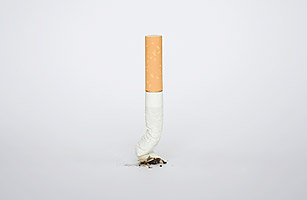
Forget Viagra. Research suggests that for firmer, faster erections, men should quit smoking. Scientists have found that men who successfully kick cigarettes can have thicker, more rigid erections and reached maximal arousal five times faster than smokers who relapse.
A June 2016 study also found that men who smoke have more damage to their sperm than nonsmokers. In the study, published in the journal BJU International compared 20 non-smoking and 20 men who smoke. Smokers had a higher percentage of damaged sperm, possibly due in part to inflammation observed in the testes and accessory glands. Smoking appeared to decrease health activity in the sperm, and caused more DNA fragmentation in the sperm. These problems with the men’s sperm could influence their fertility.
Another 2011 study involved 65 sexually active male smokers who wanted to quit and were willing to have their erections measured in the lab. The participants were enrolled in an eight-week quit program, which involved using nicotine patches (and no other drugs) and counseling, and were brought in for erectile testing three times: before the quit date, halfway through the program, then again one month after the program’s conclusion. To test men’s erections, the researchers used a device called a penile plethysmograph, which measures changes in circumference and hardness, while the men watched porn.
Thirty-one percent of the men had successfully stopped smoking by the end of the study. Compared with men who relapsed, those who remained nicotine-free had wider, firmer erections and reached maximum sexual arousal (but, importantly, not climax!) much more quickly. These improvements were not seen, however, until after the men had stopped using the nicotine patches.
Twenty percent of the participants reported having erectile dysfunction (ED) at the start of the study. By the end, 75% of these men who had quit smoking, no longer suffered erectile problems. But 61% of men with ED who had not stopped smoking also saw improvement in their condition. The difference between the two groups was not statistically significant, however, researchers said.
Despite the fact that the researchers’ objective measurements showed improvements in sexual health among the quitters, there was no change in men’s own ratings of their sexual functioning, including perceptions of arousal, orgasmic function and strength of erection.
“It might take longer for men to actually notice their level of difference subjectively outside of the lab, which is also dependent on their relationship with their sexual partner,” study co-author Christopher Harte, of the VA Boston Healthcare System, told Reuters.
The current study isn’t the first to connect smoking with sexual health. Smoking is known to damage blood vessels and hinder proper blood flow, which can also affect erectile function. Just this week, researchers from the Mayo Clinic found that men who made lifestyle changes to improve their cardiovascular health — by lowering cholesterol and blood pressure, losing weight and exercising — also improved their symptoms of ED.
The new findings, published in the British Journal of Urology International, suggest it’s not just smoking, but nicotine itself that causes erectile problems, since improvements in men’s erections weren’t seen until after use of the patch was stopped.
The good news is that doctors may now have a new strategy to help people quit smoking. For many people, the long-term fear of cancer or heart disease isn’t enough to motivate them to quit — or, worse, it can backfire by increasing stress and, in turn, the urge to smoke — but the promise of immediate and measurable improvements where it counts might be just the incentive male smokers need.
So, guys, the next time you have the urge to light up a post-coital Lucky, you might stop to think about whether it’ll keep you from your next chance to crave one.
More Must-Reads from TIME
- Why Biden Dropped Out
- Ukraine’s Plan to Survive Trump
- The Rise of a New Kind of Parenting Guru
- The Chaos and Commotion of the RNC in Photos
- Why We All Have a Stake in Twisters’ Success
- 8 Eating Habits That Actually Improve Your Sleep
- Welcome to the Noah Lyles Olympics
- Get Our Paris Olympics Newsletter in Your Inbox
Contact us at letters@time.com